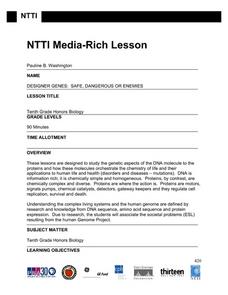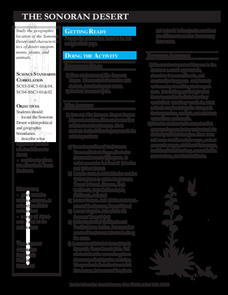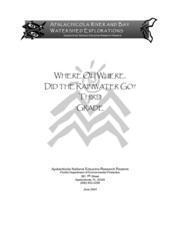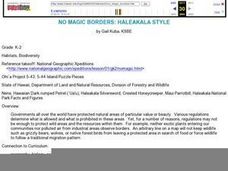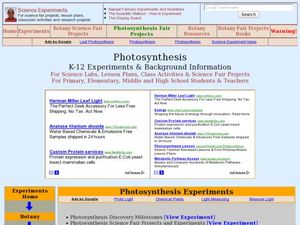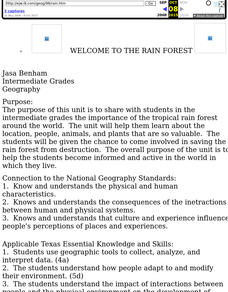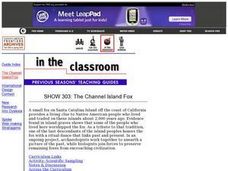Curated OER
Annual Wetland Plant Diversity Survey
Learners locate an area of marsh and, by measuring the total number of individual plants in a sample area, determine whether purple loosestrife population density is correlated to the total plant diversity of the community. They...
Curated OER
Ecology
Students explore, experience and experiment identifying the human impact on the environment of vegetative differences within the same biome. They assess what causes deserts, rain forests, savannahs, tundras and saguaros and how these...
Curated OER
Temperature and the Tomato
You will need a photovoltaic system and monitor at your school in order to obtain all of the data required to thoroughly implement this instructional activity. Your class monitors daily temperature and insolation amounts over a two week...
Curated OER
The Sonoran Desert
Little learners examine a map of the southwestern United States and identify the Sonoran Desert. They locate different cities and rivers, determining whether or not each is found within this special ecosystem. A student handout is...
Curated OER
Natural History of Costa Rica
Young scholars use outline maps to become acquainted with Costa Rica. They see how it was formed and how its origin has created very diverse environments. Students then use atlases and compare their physical maps with maps of climate and...
Curated OER
Rain Forests: A Disappearing Act?
Students examine and locate rainforests on maps, and research the patterns of their destruction. They develop a bar graph of rainfall and temperature data, write a journal entry, and research the people, animals, and plants/products of...
Curated OER
Biodiversity in an Estuary
Young scholars investigate the biodiversity in estuaries. In this estuary lesson plan, students use Google Earth to explore the Rookery Bay National Estuarine Research Reserve. They produce a biodiversity concept map and portray the life...
Curated OER
Predator Or Prey?
Students study the concept of predator/prey by researching specific examples of birds. They participate in a concept map/webbing activity to determine different characteristics of birds. They engage in a class discussion about...
Curated OER
Where Oh Where Did the Rainwater Go?
Third graders conduct an experiment to determine how water moves through different soils found in the Apalachicola River watershed. They read a scenario, conduct the experiment, answer follow-up questions, and draw the water movement...
Curated OER
No Magic Borders: Haleakala Style
Students discuss borders and boundaries. They discuss pollution and the fact that boundaries cannot stop pollution and that pollution affects even protected wildlife and plants. They participate in an activity in which they must place...
Curated OER
California Biodiversity
Students examine several maps of California exhibiting features such as precipitation, topography, and vegetation. They look for patterns that might be the source of or influence biodiversity in different regions. They pay particular...
Curated OER
Desert Views - First Impressions: Travelers on the Gila Trail
Students draw animals and plants that are described to them as they read passages of people who traveled across the Gila Trail in the Southwest. In this Gila Trail lesson plan, students also write a letter describing a plant or animal in...
Curated OER
Photosynthesis
Young scholars explore the concept of photosynthesis. They describe the light and light independent reactions of photosynthesis. Students relate physical plant characteristics to their functions. They distinguish between C3, C4, and CAM...
Curated OER
Seed Transport
Students explore botany by completing KWL worksheets. In this seed transportation lesson, students define a list of vocabulary terms associated with botany and seedlings before completing worksheets based on assigned text. Students...
Curated OER
Windmills and Blogs: The Impact of Technology in Rural Peru
How does technology affect a community? Research the benefits and consequences of technology in rural Peru. For this technology lesson, learners discuss how the effects of technology. They view a PowerPoint and learn about the Peace...
Curated OER
Fresh Produce North of 60
Teen-agers discuss how fresh produce is brought into areas that do not have agreeable growing conditions and read an article from Canadian Agriculture at a Glance. They write an essay about projects that may help provide food in these...
Curated OER
Welcome to the Rain Forest
Fourth graders become aware of the worlds rain forest and study the plants of the rain forest and the adaptations they have made to survive in the environment.
Curated OER
Labor Needs in Colonial America
Students examine the labor needs in colonial America. Using primary and secondary resources, they explore the major events and life in the United States during colonial times. They complete a chart listing the pros and cons of a slave...
Curated OER
Wasting Times
Students examine Britain's waste management proposals. In this environmental stewardship lesson, students visit linked websites to gain an understanding of proposals to reduce waste in the nation.
Curated OER
SHOW 303: The Channel Island Fox
Students explore how archaeologists and other scientists use different clues to piece together a picture of the past. Students perform activities that allow them to conduct three types of scientific research. They discuss their...




